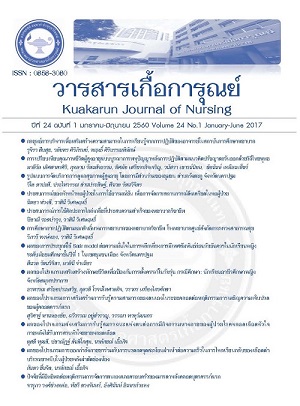การเปรียบเทียบคุณภาพชีวิตผู้สูงอายุแบบบูรณาการพหุปัญญา หลังการปฏิบัติตามแนวคิดปรัชญาตะวันออกด้วยวิถีไทยพุทธ* The Comparison of Quality of Life for the Elderly under Multiple Intelligence Integration after Practice Based on Eastern Philosophy in the Thai B
คำสำคัญ:
Quality of life, Eastern philosophy in the Thai Buddhist style, Elderly people, Multiple intelligence integrationบทคัดย่อ
การวิจัยนี้เป็นการวิจัยแบบผสมเชิงปริมาณและคุณภาพ เพื่อเปรียบเทียบคุณภาพชีวิตผู้สูงอายุแบบบูรณาการพหุปัญญา หลังการปฏิบัติตามแนวคิดปรัชญาตะวันออกด้วยวิถีไทยพุทธกลุ่มตัวอย่าง คือ ผู้สูงอายุจำนวน 457 คนแบ่งเป็น 2 กลุ่ม คือ กลุ่มที่มีการปฏิบัติตามแนวคิดปรัชญาตะวันออกด้วยวิถีไทยพุทธจำนวน 212 คน และกลุ่มที่ไม่ได้ปฏิบัติจำนวน 245 คน กระจายทั่วประเทศในภาคเหนือ ภาคกลาง ภาคตะวันออก เฉียงเหนือ ภาคตะวันตกและภาคใต้ใช้ขนาดของกลุ่มตัวอย่างมากสุดที่คำนวณได้ด้วยสูตรยามาเน่ เครื่องมือวิจัยเป็นแบบสัมภาษณ์ประกอบด้วยข้อมูลทั่วไป ข้อมูลคุณลักษณะพหุปัญญาของผู้สูงอายุ พฤติกรรมส่งเสริมสุขภาพความมั่นคงทางอารมณ์ และข้อมูลการปฏิบัติตามแนววิถีไทยพุทธที่ผ่านการตรวจความตรงเชิงเนื้อหาโดยผู้ทรงคุณวุฒิ และวิเคราะห์ค่าความเที่ยงได้ .70 วิเคราะห์ข้อมูลโดยหาค่าความถี่ร้อยละ ค่าเฉลี่ย ส่วนเบี่ยงเบนมาตรฐาน วิเคราะห์เนื้อหา การทดสอบค่าทีไคสแควร์ และวิเคราะห์เนื้อหา ผลการวิจัย พบว่า ผู้สูงอายุที่ปฏิบัติตามแนวคิดปรัชญาตะวันออกด้วยวิถีไทยพุทธ มีคุณลักษณะพหุปัญญาสูงกว่ากลุ่มผู้สูงอายุที่ไม่ได้ปฏิบัติอย่างมีนัยสำคัญทางสถิติที่ระดับ .001 เกี่ยวกับความฉลาดด้านจินตนาการ ด้านการเคลื่อนไหว ในการสร้างสัมพันธภาพ การเข้าใจตนเอง การเข้าใจธรรมชาติและการคิดใคร่ครวญ ในส่วนที่สูงกว่าอย่างมีนัยส????ำคัญทางสถิติที่ระดับ .05 คือ ความฉลาดด้านตรรกะ และมิติภาวะสุขภาพด้านพฤติกรรมส่งเสริมสุขภาพของผู้สูงอายุเกี่ยวกับ พฤติกรรมการออกกำลังกายหรือทำงานจนเหงื่อออกและพฤติกรรมโดยรวมของผู้สูงอายุ สำหรับคุณภาพชีวิตผู้สูงอายุมิติความมั่นคงทางอารมณ์ ไม่มีความแตกต่างทางสถิติ ผลการวิเคราะห์เนื้อหาพบว่า การปฏิบัติตนด้วยวิถีไทยพุทธ ทำให้ผ้สูงอายุมีคุณค่าและไม่เป็นภาระของครอบครัว ทำแล้วสบายใจ มีสติ ช่วยให้ปล่อยวางมากขึ้น ชีวิตและสุขภาพดีขึ้น โดยมีวัดเป็นศูนย์รวมจิตใจ ข้อเสนอแนะคือควรมีกลไก จูงใจให้ผู้สูงอายุกลุ่มที่ไม่ปฏิบัติ สนใจในการเข้าร่วมกิจกรรมปฏิบัติตามแนวคิดปรัชญาตะวันออกด้วยวิถีไทยพุทธ ซึ่งจะช่วยเพิ่มคุณภาพชีวิตให้กับผู้สูงอายุ
The purpose of this mixed method research was to compare quality of life for the elderly under multiple intelligence integration after practice based on eastern philosophy in the Thai Buddhist style. The sample included 457 elderly persons who stayed in the north, the central region, the northeast, the western, the south, which was divided into 2 groups 1) 212 elderly persons who practiced base on eastern philosophy in the Thai Buddhist style 2) 245 elderly persons who did not practice. The maximum sample sizes were calculated by Yamani rule. The research tool was interview test including personal data, quality of life for the elderly under multiple intelligence integration, health promoting behavior, emotional stability and the data of practices base on eastern philosophy in the Thai Buddhist style. The research tool was validated by a group of experts and the reliability was 0.70. The data were analyzed by frequency, percent, mean, standard deviation, independent t-test, chi-square and content analysis. The results indicated that the elderly persons practiced base on eastern philosophy in the Thai Buddhist style had the characteristics of multiple intelligence higher than the other group of elderly persons with no practice, it was statistically difference at significant level .001 in the visual-spatial intelligence, bodily-kinesthetic intelligence, interpersonal intelligence, intrapersonal intelligence, naturalist intelligence, and existential intelligence. While it was statistically difference at significant level .05 in the logical-mathematic intelligence and health behavior of elderly in the aspect of exercise. However, quality of life of the elderly persons practiced base on eastern philosophy in the Thai Buddhist style about emotional stability was not different in the elderly persons group with no practice. The content analysis found that the practice in the Thai Buddhist style could add the value and not a burden to the family. The elderly had a conscious mind, more quality of life and health by using the temple for center. Therefore, the findings suggested that it should have strategies to motivate the elderly persons with no practice to practice based on eastern philosophy in the Thai Buddh i st style in order to improve the quality of life for the elderly persons.

















